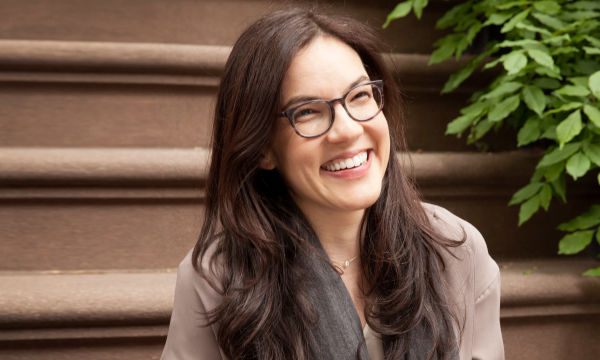
The Rocket Years: Author Liz Segran on How Your Twenties Launch Your Life
Our twenties are crucial for career-building, but we can benefit from that decade’s lessons at any age.
In her new book, The Rocket Years: How Your Twenties Launch the Rest of Your Life, journalist (and M.M. customer!) Liz Segran emphasizes the importance of “purposeful exploration” in one’s twenties. “During that phase of life, there’s a central tension between making decisions that will set us on the right course in life and also being open to chaos and making mistakes. Both of those things are really valuable,” she says.
Although her book is primarily geared toward twenty-somethings who want to build fulfilling lives, its lessons apply to anyone attempting to make good decisions in the face of uncertainty—and right now, that’s all of us. “Things are overwhelming,” Liz notes of the coronavirus crisis. “But this is also a valuable opportunity to check in with ourselves. The way that we deal with crisis and chaos can be very instructive, and the self-knowledge we gain now will help us down the road.”
Below, we talk to her about why our twenties are so crucial for career-building and how we can benefit from that decade’s lessons at any age.
Want more M Dash?
Sign up for our weekly newsletter.
Thank you!
What inspired you to write about this topic?
I remember the exact day I decided to work on this project. I was in my early thirties. I had recently gotten married, and I had a new baby. I had just spent two hours putting my daughter to sleep, and I collapsed on my couch, exhausted. I looked around my house, which had been taken over by this small child—toys everywhere, crushed blueberries on the floor—and suddenly understood the permanence of some of my recent decisions. It was jarring, because just a few years before, in my twenties, my life had felt so fluid and full of possibilities. I became fascinated by the decisions I’d made—sometimes unknowingly—that had set me on my course in life. I wanted to do a deeper dive into that subject: how our twenties set the stage for the rest of our lives.
What do you hope readers take from this book?
That there’s no “right” path. We all have different dreams and ambitions, but young people today have more opportunities to shape their futures than any other time in history. We have more choice over what kind of career to pursue, when and whom (and if!) we marry, and whether to have children. Having these options is so empowering, but it can also feel paralyzing. My goal is to help people think through what matters to them, what they want to get out of life, and then to help chart a course toward that particular future.
How is career-planning different today than it was for past generations?
The entire concept of work has changed over the last few decades. Whereas prior generations of young professionals were concerned with finding a “real job” (that is, a job that would provide financial stability and status in the world), our generation is searching for the “dream job” (one that reflects our values, passions, and skills). Nowadays, we want a job that aligns with our identity—not just a job that will make us a lot of money. This is a major cultural shift, and it signifies that work has the potential to be a lot more fulfilling today than it has been in the past.

Is the “dream job” really attainable for most people?
The data shows that by the time people are in their mid-careers, most have a lot of satisfaction in their jobs. But it takes a decade or so to get there. It’s often a nonlinear path that involves a lot of searching and can be marked with disappointments—periods where you might not get along with a particular boss, you might not like the culture of a particular workplace, you might discover that the skills you thought you had don’t match up with your role, etc. Learning from those experiences allows you to ultimately find the right path, and it’s absolutely possible to build a career that makes you feel deeply satisfied. But you need to be patient with the process and accept that there may be some choppy waters along the way.
What are your thoughts on job-hopping?
Nowadays, most people change jobs more than a dozen times in their lives, and most of those changes take place in your twenties. Job-hopping is beneficial because with each job, you’re learning new skills, getting salary increases, growing your network, and gaining valuable experience. As long as you stay at each job for at least one or two years, it won’t be a mark against you to jump around. Once you enter your thirties, however, the benefits of job-hopping begin to diminish, because it becomes more valuable to have a depth of experience in a particular field.
What if you still have no idea what you want to do, even a few jobs in?
The gig economy is a good way to explore your skills and interests by taking on freelance positions or projects. That option wasn’t widely available a couple of decades ago, but now, it’s a great way to explore interests without committing to a full-time job.

Your book stresses the importance of hobbies. Why is this such an important complement to a career?
It can seem counterproductive to invest time in a hobby while you’re building your career, but over the course of your life, a hobby provides you with important balance—and can even help you be more productive at work. But because most of us don’t pick up new hobbies once we enter our thirties, it’s important to establish those interests when we’re in our twenties and have the freedom and time to do so.
I have a confession: I’m 36. Did I miss the boat when it comes to thinking through all this in my twenties?
No! First of all, you can always go back and reflect on your twenties and the “origin story” you created for yourself at that time, which is part of the narrative you still carry with you. Taking time to revisit and reconnect to the passions, ambitions, and lessons of your twenties is something you can do at any age. Second, there’s always room to course-correct. We’re very “unwritten” in our twenties, because there are a lot of decisions we haven’t yet made, but even as we get older, we continue to ask ourselves: “What is it that I want out of life?” This book is meant to help you think through that question and then take meaningful action, no matter where you’re starting from.
We're in the midst of an unprecedented global pandemic. What lessons from your book can we apply in this moment?
In my book, I try to give people tools to process that feeling of anxiety that is so prominent in our twenties: tolerating a certain amount of chaos, but also finding ways to reframe it in a way that is helpful so we can make good long-term decisions. Right now, we’re going through something similar as a culture. We’re in this moment of uncertainty where we’re reacting to a lot of stress, and we’re being tested in different ways. We can learn a lot about ourselves and our world in moments like this.







